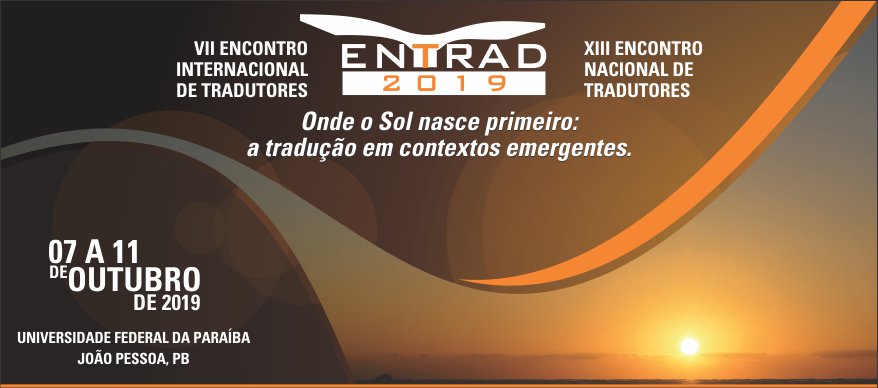Antes de se inscrever, leia as orientações AQUI
Tradução de variação linguística em textos literários
Translation of linguistic variation in literary texts
Elton Luiz Aliandro Furlanetto
UNINOVE
eltonusp@hotmail.com
http://lattes.cnpq.br/4894694545222837
Ildney de Fátima Souza Cavalcanti
UFAL
ildneycavalcanti@uol.com.br
http://lattes.cnpq.br/5481619568292015
Idiomas de trabalho | Work languages: Português, English, Español
Resumo: Como integrantes dos Grupo de Estudos de Adaptação e Tradução (GREAT – http://dgp.cnpq.br/dgp/espelhogrupo/1897787761898965) e do grupo Literatura e Utopia (http://dgp.cnpq.br/dgp/espelhogrupo/5632848401900219), notamos que muito da literatura produzida nos mais diversos gêneros e épocas utiliza de variações linguísticas que indicam desde o uso discreto de elementos de oralidade na escrita até a presença mais marcada de dialetos ou do multilinguismo, os quais exercem funções específicas na expressão de significado dentro de determinada narrativa. Em face desses fenômenos de marcação da linguagem, as pessoas que traduzem, e o próprio polissistema tradutório no qual estão inseridas, devem desenvolver estratégias para lidar com variedades, que podem assumir a forma de dialetos, criações neológicas, marcas de oralidade e de idiosincrasias linguísticas, além das línguas inventadas em processos de worldbuilding. Nota-se um recente e crescente interesse no tema em questão pela multiplicação de artigos e estudos encontrados nas bases de pesquisa no Brasil e no exterior. Partindo de pressupostos teóricos sobre o diálogo na literatura, apresentados por Leech and Short (2007), e no Brasil por Dino Preti (1974) e Hudinilson Urbano (2000), bem como em pesquisas sobre diferentes manifestações linguísticas no texto literário (como exemplo, Sarian, 2002; Hanna, 2006; Hanes, 2011; Carvalho, 2007, 2017; Ramos, 2009), explicitamos a necessidade de enfatizar a presença da variação linguística nas línguas originais e a presença/ausência/mudança delas nas traduções feitas para qualquer língua-alvo. O objetivo geral é o de refletir sobre o papel desempenhado pelas variantes na caracterização de narradores e personagens, e sobre a consequente criatividade de tradutores/as para apresentar essas variantes, em diferentes gêneros literários e épocas. Nossos objetivos específicos são o de compreender as interfaces entre os estudos sociolinguíticos mais recentes e verificar de que maneira autores/as e tradutores/as aplicam, de forma consciente ou não, estruturas que materializam uma gama de efeitos retórico-discursivos. As comunicações esperadas deverão se concentrar em análises de variações linguísticas nas línguas originais e estabelecer relações com as variações (ou a ausência delas) nas traduções. Tomamos o conceito de literário em sua forma mais abrangente, o que pode incluir diversos gêneros literários, como os fantasismos e utopias/distopias, além de outras linguagens ficcionais como quadrinhos, séries, filmes, nas quais o texto apresente alguma variação.
Palavras-chave: Tradução literária, Variantes linguísticas, Oralidade
Abstract: As members of the Research groups Grupo de Estudos de Adaptação e Tradução (GREAT – http://dgp.cnpq.br/dgp/espelhogrupo/1897787761898965) and the group Literatura e Utopia (http://dgp.cnpq.br/dgp/espelhogrupo/5632848401900219), we notice that much of the literature produced in the several genres and epochs uses linguistic variations, which may take the form of discrete elements of orality in the written text or the presence of dialect or multilingualism. They perform some specific functions in the expression of meaning within a certain narrative. Due to these phenomena of linguistic marking, translators, and the translational polysystem in which they are inserted, must develop strategies to deal with varieties, which may take the form of dialects, neologic creations, orality markers and linguistic idiosyncrasies, as well as invented languages that appear in narrative worldbuilding. We also notice a recent and increasing interest in the theme under scrutiny by the number of studies and articles found in research databases both in Brazil and abroad. Departing from the theoretical framework of dialog in literature, such as in the study by Leech and Short (2007) and in Brazil by Dino Preti (1974) and Hudinilson Urbano (2000), as well as research about different linguistic manifestations of the literary text (for instance, Sarian, 2002; Hanna, 2006; Hanes, 2011; Carvalho, 2007, 2017; Ramos, 2009), we understand the need to emphasize the presence of linguistic variations in the source texts and the their presence/absence/changes in translations to any target language. The general objective is to reflect on the role of variations in the characterization of narrators and characters, and the ensuing creativity of translators to bring forth these variations in several genres and historical periods. Our specific objectives are to understand the interfaces between the state-of-the-art sociolinguistic studies and verify the ways authors and translators apply, deliberately or not, structures that materialize a wide range of rhetorical-discursive effects. The expected oral presentations should focus on analyses of linguistic variations in the source languages and create relations with variations (or their absence) in translations. We understand literature in a broader perspective, and it may include several literary genres, including fantasisms and utopias/dystopias, as well as other fictive media like graphic novels, series, movies, in which the text shows any type of variation.
Keywords: Literary translation, Linguistic varieties, Orality
Antes de se inscrever, leia as orientações AQUI
